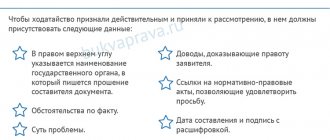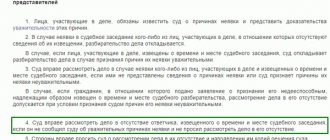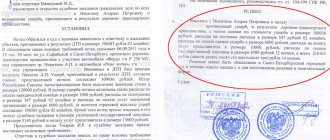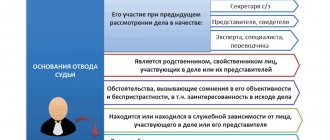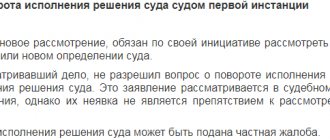Grounds for recusal
Recusal refers to the removal of a judge from considering a case.
It is provided if a person is directly or indirectly interested in the outcome of the case. The procedure is also carried out if the participants in the case have doubts about the impartiality of the judge. The Code of Civil Procedure of the Russian Federation (Articles 16, 17) reflects the grounds for recusal. They are divided into two groups: objective and conditional.
The following grounds can be considered objective.
- The judge has previously considered this case. In accordance with legislative norms, his repeated participation is no longer allowed. The ban does not include cases sent for review (in the absence of a note indicating the need for a new composition of the court).
- This judge, when considering the case, previously had a different procedural status, as prescribed in paragraph 1 of part 1 of Article 16 of the Code of Civil Procedure of the Russian Federation. For example, previously a judge performed the role of a prosecutor, investigator, and lawyer. When the case is returned for review, he no longer has the right to conduct it.
- The judge has family ties with the participants in the case or representatives of the law. In this case, self-recusal is declared. In the absence of such a decision, the higher court has the right to cancel the act issued after consideration of the dispute.
Objective grounds do not need to be proven, since they are easy to confirm.
Conditional grounds necessarily require an evidence base. They are evaluative and subjective.
The judge may have a direct or indirect interest in the outcome of the case. If it is beneficial for him to resolve the dispute in favor of one participant, then a challenge is carried out.
You can demonstrate your personal interest by making sure that:
- the plaintiff or defendant are close friends, relatives or acquaintances of the judge;
- the case involves organizations where relatives of the judge work;
- The judge expects a reward from one of the parties based on the results of the proceedings.
Some amendments were made to the withdrawal procedure. The same person cannot apply for this unless the grounds have changed. If the application is not satisfied, the participant cannot submit the application again.
Sample application for disqualification of a judge in a criminal case
To the Oktyabrsky District Court
city of Yekaterinburg, Sverdlovsk region
Judge Alena Andreevna Khabarova
from Lawyer
Statement
on the challenge of a judge in criminal proceedings
The Oktyabrsky District Court of the city of Yekaterinburg is prosecuting a criminal case accusing S. of committing crimes under Part 1 of Article 119 and paragraph “h” of Part 2 of Article 112 of the Criminal Code of the Russian Federation.
According to the prosecution, on September 13, 2021, at about 4:20 p.m. on a street in the Oktyabrsky district of Yekaterinburg, during a quarrel, the accused caused bodily injuries to the victim that resulted in moderate harm to health, while at the same time death threats were made.
In accordance with Part 1 of Article 64, Part 5 of Article 65 of the Code of Criminal Procedure of the Russian Federation, in the presence of circumstances provided for in Articles 61 and 63 of this Code, a judge may be challenged by participants in criminal proceedings.
If an application to challenge a judge, several judges or the entire court is satisfied, the criminal case, petition or complaint is transferred to the proceedings of another judge or another court, respectively, in the manner established by this Code.
In this case, only during the consideration of the case did the defense become aware of circumstances giving reason to believe that the presiding judge in a criminal case is personally, directly or indirectly, interested in the outcome of this criminal case, namely:
- On August 17, 2018, the defense attorney filed a complaint under Article 125 of the Code of Criminal Procedure of the Russian Federation in the same case against the decision to select a preventive measure in the form of a written undertaking not to leave the place and proper behavior. This complaint was also considered by judge A.A. Khabarova. At the same time, taking into account the provisions of Part 3 of Article 125 of the Code of Criminal Procedure of the Russian Federation, this complaint was subject to consideration no later than August 24, 2018. However, in reality, the decision was made only on September 5, 2018, that is, after 19 days had passed from the date the complaint was received by the court.
- It is noteworthy that the hearings to consider the complaint were postponed 4 times due to the failure of the entire criminal case to reach the court. At the same time, the norms of the current Code of Criminal Procedure of the Russian Federation do not stipulate that a complaint in accordance with Article 125 of the Code of Criminal Procedure of the Russian Federation can be considered exclusively together with the entire criminal case. Moreover, all the necessary documents - the contested decision and documents substantiating the arguments of the complaint - were attached by the defense attorney when submitting the document to the court. Under such circumstances, it is not seen that there are any real, valid, justified obstacles to the consideration of the complaint within the 5-day period established by law. The result of such delay in consideration of the complaint was the termination of the proceedings on the complaint due to the receipt of a criminal case for consideration on the merits.
Thus, there are reasonable grounds to believe that the consideration of the complaint filed in defense of interests was deliberately delayed until the criminal case arrived in court for consideration on its merits in order to terminate the proceedings on the complaint against the decision to select a preventive measure, thereby depriving the accused of the opportunity to challenge the decision following the procedure of Article 125 of the Code of Criminal Procedure of the Russian Federation.
USEFUL: watch the video and find out why it is better to correct any sample claim, complaint or complaint with our lawyer, write a question in the comments of the video
When the court makes a decision based on the results of consideration in the framework of this criminal case, the defense’s motion to return the criminal case to the prosecutor by the presiding judge Khabarova A.A. Only one argument of the defense was assessed – the defense’s failure to consider and receive decisions based on the results of the motions submitted during the preliminary investigation. At the same time, the reason for refusing to satisfy the request to return the criminal case to the prosecutor is indicated in the resolution by the presence of covering letters in the case materials. However, it is obvious that the mere presence of covering letters does not in any way confirm the direction of the decisions to the defender.
It is noteworthy that after the preliminary hearing, the investigator sent controversial decisions to the defense lawyer based on the results of consideration of all defense motions during the preliminary investigation. Moreover, according to the postmark, the shipment was made on October 12, 2018, that is, validly after the court considered the petition to return the criminal case to the prosecutor.
In such circumstances, taking into account the fact that the appellate court is endowed with a similar right to return the criminal case to the prosecutor, the prosecution, in order to exclude the emergence of the same argument in the second instance court, takes actions to eliminate the allowed build-up of the right to defense, essentially recognizing the validity of the stated petitions to return the criminal case to the prosecutor. Thus, both the defense and the prosecution were clear about the actual existence of violations of the right to defense. Contrary to this, the court made the exact opposite ruling.
Additionally, it should be noted that in the aforementioned court decision, issued following the resolution of the petition to return the criminal case to the prosecutor, a significant number of defense arguments were not assessed by the court at all. In addition, numerous defense motions subsequently filed during the consideration of the criminal case on the merits were completely rejected with reference to their prematureness and the court’s failure to examine the case materials.
This part reveals duality when the presiding judge considers the same issues - the study of written materials of the case: in the first case, to substantiate the position of the prosecution at the preliminary hearing, the case materials were examined immediately, in the second - to protect rights, the study of the case materials was not carried out at all. The stated circumstances sufficiently indicate that the presiding judge in a criminal case makes procedural decisions, the consequence of which is always essentially the “protection” of the prosecution and at the same time a violation of the rights of the defendant.
Based on the above, guided by the above standards,
ASK:
- to withdraw the presiding judge in the criminal case pending at the Oktyabrsky District Court of the city of Yekaterinburg, Sverdlovsk Region, on the charge of my client of committing crimes under Part 1 of Article 119 and paragraph “h” of Part 2 of Article 112 of the Criminal Code of the Russian Federation, Judge Alena Andreevna Khabarova and transfer this case to another judge of the Oktyabrsky District Court of the city of Yekaterinburg, Sverdlovsk Region.
Applications:
- A copy of the resolution;
- Copies of investigator's orders received by Russian Post in the amount of 9 pieces with accompanying letters attached to them;
- A copy of the received postal envelope with a postmark;
- A copy of the certificate of availability of documents in the received mail
Date, signature
When is the application submitted?
According to Part 2 of Article 19 of the Code of Civil Procedure of the Russian Federation, a petition for recusal must be filed before the consideration of the dispute.
It is transmitted when a preliminary hearing is held. Even if doubts about the work of the court arose during the consideration of the dispute, you can submit the appeal. Reference! A party has the right to file a petition at the time of consideration of the dispute on the merits. But in this case, it is important to prove that the grounds for such measures appeared only during the hearings. In the absence of such confirmation, the claim will be denied.
Application of grounds
Almost all the reasons are clear.
If there is a specific fact, the judge must recuse himself or consider an application for recusal filed by a participant in the process. Family, inherent connections, the judge’s previous participation in the process in a certain status - all this can be easily confirmed with 1-2 documents. An exception is the basis provided for in clause 3, part 1, art. 16 Code of Civil Procedure of the Russian Federation. It allows you to file a challenge under any circumstances, when there are only suspicions about the bias and impartiality of the judge.
In order to prevent unfounded suspicions, to challenge the judge on the basis of clause 3, part 1 of Art. 16 Code of Civil Procedure of the Russian Federation it is necessary:
- Point out specific and real circumstances that indicate the judge’s interest in the outcome of the case or otherwise indicate his bias and impartiality.
- Prove the existence of such circumstances.
- Prove that there is a cause-and-effect relationship between such circumstances and the judge’s interest in the outcome of the case or his bias and impartiality.
All this must be stated in the application to challenge the judge. Thus, it is not enough to simply say that a judge is biased, biased, or has a vested interest in making a particular decision.
How is an application made?
An application for recusal is drawn up in writing.
Oral communication is also allowed. But it is better to submit the appropriate document, which will reflect all the grounds. The application can be submitted in any form, but it is necessary to follow a certain order of presentation of data:
- The name of the court where the appeal is filed is indicated.
- The applicant enters his personal information (last name, first name, patronymic) and residential address.
- The details of the court case and its name must be reflected.
- The main part provides the grounds for challenge. They must be motivated, refer to the attached evidence and norms of legislative acts.
- Next is a request to remove the judge from considering the civil case.
- After the main application, originals and copies of documents justifying the citizen’s position are attached.
- At the bottom of the document is the date of compilation, the signature of the person and its transcript.
The application is submitted without paying a state fee. No negative consequences (for example, fines) are provided even in case of deviation. In this way, a citizen exercises his right within the framework of the law.
Download a sample petition to disqualify a judge in civil proceedings
Procedure for challenging a judge
If the initiator of the challenge of a judge is a participant in the process, then he must address the court with a corresponding application. It can be done either orally or in writing. The second option is considered preferable. This allows you to attach the application to the case and avoid incorrectly recording the applicant’s position and its justification in the minutes of the meeting.
There are no special procedural requirements for a recusal application. The most important thing is to clearly state what basis needs to be applied, why and how its presence is confirmed.
The procedure is regulated by Art. 20 Code of Civil Procedure of the Russian Federation . It differs somewhat from the procedure for disqualifying other participants in the process:
- The judge has the right to recuse himself at any time if he has established grounds for this.
- If a challenge is filed by a participant in the process and the case is considered by a single judge, the decision on the challenge is made by the judge himself.
- If the case is considered collegially, the decision to disqualify a judge is made collegially - by voting by the same composition of the court, but in the absence of the disqualified judge. If the votes “for” and “against” are equal, the decision is considered positive.
- If the case is considered collectively and several or all judges are challenged, then the issue is resolved by the full composition of the court. A majority vote is required to make a positive decision on recusal.
The decision to challenge is formalized by a ruling. If you disagree with it, you can appeal it, but, unfortunately, only together with the final decision in the case.
Result of consideration of the application
After consideration of the petition, a determination is made.
The document is prepared for both positive and negative decisions. The refusal cannot be appealed separately. The applicant must include arguments about the illegality of the decision made in the text of the complaint if he considers the act controversial. In the event of an unjustified refusal, the act may be canceled. Attention! In accordance with the norms of the Code of Civil Procedure of the Russian Federation, after a judge or court panel is disqualified, the case will be considered by the court of the same instance.
If a positive decision is made, the following consequences may occur.
- When a magistrate is disqualified, the district court appoints another judge within the same territory. If this is not possible, the case is transferred to an authority in another district.
- When a case was considered by a district court, but the composition was changed, it is transferred to another panel of the same body. In other cases, another district court is selected.
- Sometimes a decision is made by the Supreme Court of the Russian Federation in relation to judges of a republic, region or level of another subject of the Russian Federation. The dispute will be considered by other judges of the same body. In the absence of a new panel, the Supreme Court of the Russian Federation decides where to transfer the case.
What reasons cannot be grounds for disqualifying a judge?
All other reasons not listed above cannot be grounds for the removal of this official. Therefore, if you filed a petition to disqualify a judge in a civil trial, but wrote there that you want to do this for some other circumstances, then most likely it will be rejected.
In the absence of evidence, the same thing will happen, since the judge will decide that the parties or participants are doing this out of personal animosity towards him.
The following reasons also cannot be grounds for disqualifying a magistrate in a civil case:
- the judge’s rejection of any evidence in the case;
- the claim in the case remained without consideration;
- other actions on the part of the judge that do not contradict legislative acts.
A judge is the main official on whom the outcome of a case directly depends, therefore, often, if his actions do not suit one of the participants in the process, they begin to blame him, although there is no legal basis for this.
Arbitrage practice
An analysis of judicial practice shows that many petitions remain unsatisfied.
This is due to the fact that the statements provide reasons that cannot be accepted as objective in accordance with the law. For example, in the court of general jurisdiction of the first instance of the city of Petropavlovsk-Kamchatsky, a civil case was heard on the complaint of citizen V. to officials of the city administration. But Judge Ch. postponed the hearing for a month based on a petition from an administration representative.
Before the case was considered, lawyer V. filed an application to disqualify judge Ch. Reasons were given according to which doubts might arise about the impartiality of the judge.
The request was not granted. The ruling stated that the circumstances cited in the application were not specified in the Code of Civil Procedure of the Russian Federation.
Most often, in refusals to satisfy applications, it is noted that the documents do not contain the circumstances provided for by the Code of Civil Procedure of the Russian Federation. Therefore, they are drawn up only with provisional grounds and are not supported by specific documents.
The judge's recusal must be made before the case is considered on the merits. But if new circumstances emerge at the time of the preliminary hearing, the parties also have the right to file a motion. It must be expressed in writing and have grounds for challenge. Each circumstance is documented using applications. After consideration of the appeal, it may or may not be satisfied.
Commentary on Article 16 of the Code of Civil Procedure of the Russian Federation in its current edition
The grounds for challenge established by Article 16 of the Code of Civil Procedure of the Russian Federation in the current version apply to all judges of all instances considering civil cases. They are the same for both a magistrate judge and a judge of the Supreme Court of the Russian Federation. The commented article contains a specific tool for implementing the constitutional principle of independence, objectivity and impartiality of judges.
The institution of recusal was introduced into the procedural law primarily in the interests of the participants in the trial. At the same time, it is also convenient for the judges themselves, allowing them to remove themselves from a case in which doubts about its impartiality may even arise.
The first case excludes the participation of a judge in the consideration of a case if he previously had some kind of procedural status in this case. A judge who previously took part in the case could have formed a certain position on the order of consideration of the case on the merits, developed certain relationships with other persons participating in the case, which will subsequently affect its objectivity.
The second case covers the situation when relatives or relatives of the judge are involved in the case. Moreover, in this case, judicial practice proceeds from an expanded interpretation of the concept of relative, including relatives not only of close ones, but also of more distant levels. In this article, relatives are understood as relatives along the line of the judge’s spouse, including distant ones.
The third ground for disqualifying a judge is more general, allowing it to cover situations where the judge's interest is not so obvious. The following examples of situations when a judge is subject to recusal can be given:
- the judge is interested in a certain resolution of the controversial situation, since this will bring him or his close people, including relatives or friends, direct material or legal benefits;
- the judge was previously in official or financial dependence on one of the participants in the case;
- the judge, before resolving the case on the merits, expressed his opinion on how it should be resolved;
- whether the judge has material and legal obligations with the persons participating in the case;
- whether the judge has friendly or hostile relations with the persons participating in the case.
Article 16 of the Code of Civil Procedure of the Russian Federation stipulates that during a collegial consideration of a civil case (Article 14 of the Code of Civil Procedure of the Russian Federation), relatives cannot be included in the court.
For most civil cases, the question of whether a judge is interested is removed at the stage of distributing cases between judges, which avoids reassignment of the court hearing. Otherwise, the judge may recuse himself in accordance with Article 19 of the Code of Civil Procedure of the Russian Federation or allow an application for the recusal of the judge, which any person participating in the case has the right to submit.
In the new edition of the article, paragraph 1.1 appeared, which states. that a challenge can be filed if the judge was a judicial conciliator in this case.
